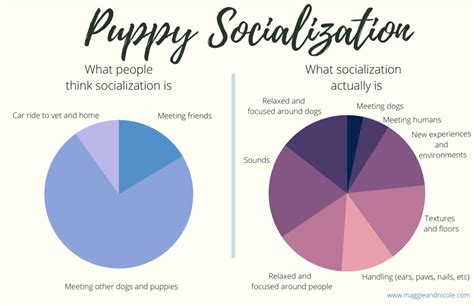Introduction
Socialization is a crucial aspect of a puppy’s development, shaping their behavior and well-being throughout their lives. Understanding the importance of socialization and implementing effective strategies can make a significant difference in raising a happy, well-adjusted dog.

Why Pet Socialization Matters
- Prevents Behavioral Problems: Socialized puppies are less likely to develop fear-based aggression, anxiety, and other behavioral issues due to positive experiences interacting with various people, animals, and environments.
- Strengthens the Bond: Socialization fosters a strong bond between puppies and their owners, as they learn to trust and rely on their human companions in different social situations.
- Improves Communication: Puppies exposed to various social stimuli develop better communication skills, enabling them to understand and convey messages effectively.
- Enhances Training: Well-socialized puppies are more receptive to training, as they are comfortable interacting with new people and environments, making the learning process less stressful.
Pet Socialization Timeline
The optimal time to start socializing puppies is between 3 and 12 weeks of age, as they are more receptive to new experiences during this period. The socialization process should be gradual and positive, allowing puppies to experience a variety of people, animals, and environments in a controlled manner.
How to Socialize Your Puppy
1. Introduce New People Gradually
- Invite Friends and Family: Have trusted individuals visit your home and interact with your puppy in a calm and friendly manner.
- Attend Puppy Playgroups: Supervised playgroups at veterinary clinics or dog parks provide opportunities for puppies to interact with each other and learn socialization skills.
- Go for Walks in Public: Take your puppy for walks in parks or around your neighborhood, exposing them to different types of people and animals in a safe and controlled environment.
2. Expose Your Puppy to Different Animals
- Controlled Interactions: Supervise interactions between your puppy and other pets, such as cats or other dogs, ensuring that both animals are comfortable and safe.
- Animal Shelter Visits: Take your puppy to local animal shelters to meet and interact with various animals, while also supporting a good cause.
- Pet Therapy: Consider enrolling your puppy in pet therapy programs, where they can interact with children and adults in healthcare or assisted living facilities.
3. Provide Positive Experiences in Different Environments
- Noisy Environments: Visit places such as pet stores, busy streets, or construction zones, gradually exposing your puppy to different sounds and sights.
- New Surfaces: Introduce your puppy to different surfaces, such as grass, carpet, tile, or concrete, to build confidence and prevent fear of these surfaces.
- Car Rides: Regularly take your puppy for short car rides to accustom them to the motion and sights associated with travel.
4. Focus on Positive Reinforcement
- Reward Good Behavior: Praise and reward your puppy for positive interactions with people, animals, and environments.
- Use Treats and Praise: Treats can be a valuable tool to reinforce good behavior and create positive associations with socialization experiences.
- Avoid Punishment: Negative reinforcement or punishment can harm the socialization process and damage the bond with your puppy.
Common Mistakes to Avoid
- Over-Socializing: Exposing puppies to too many new experiences too quickly can overwhelm and stress them. Gradual socialization is key.
- Forcing Interactions: Never force your puppy into interactions they are not comfortable with. Respect their boundaries and allow them to approach new situations at their own pace.
- Punishing for Fear: Puppies may react fearfully to some situations. Instead of punishing them, provide reassurance and support to help them overcome their fears.
- Ignoring Socialization: Puppies that are not adequately socialized can develop behavioral problems that can become difficult to manage later in life.
Benefits of Pet Socialization
- Increased Confidence: Socialized puppies develop a healthy sense of confidence, making them less fearful and reactive in new situations.
- Enhanced Adaptability: Well-socialized puppies are more adaptable to changes in their routine or environment, as they have learned to cope with different situations.
- Improved Health: Studies have shown that socialized puppies have stronger immune systems and are less likely to develop health problems associated with stress.
- Longer Lifespan: Research suggests that socialized dogs tend to have a longer lifespan compared to isolated dogs.
Pet Socialization VS Isolation
Isolation can have detrimental effects on puppies’ development and well-being. Isolated puppies may become fearful, anxious, and aggressive due to a lack of exposure to different people, animals, and environments. They may also be more difficult to train and handle, as they have not developed the necessary social skills.
Case Detail: A Tale of Two Puppies
- Socialized Puppy: “Lucky” was a puppy who received ample socialization experiences throughout his early life. He was confident, friendly, and outgoing, and quickly bonded with his family and friends. He enjoyed going for walks, playing with other dogs, and exploring new places.
- Isolated Puppy: “Luna” was a puppy who was kept isolated from other people and animals during her early life. She was fearful and anxious, and often barked and lunged at strangers. She had difficulty training and was reluctant to explore new environments.
Conclusion
Pet socialization is an essential aspect of raising a healthy, well-adjusted puppy. By providing positive and controlled exposure to a variety of people, animals, and environments, puppies learn to interact appropriately, develop confidence, and improve their overall well-being. Failure to socialize puppies can have long-term consequences on their behavior and quality of life. Therefore, it is important to prioritize socialization during the early puppyhood stage to lay the foundation for a happy and fulfilling life for your furry companion.





















